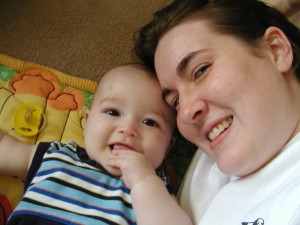Do I Have To Prepare to Breastfeed
Have you heard the one about preparing your nipples with a washcloth to “toughen” them up?
What about the one where colostrum is dirty and needs to be removed before baby can nurse?
Or, my personal favorite: “if you don’t have a perfect diet your milk will be unhealthy for your baby?”

Expecting a baby can bring out the planner in even the most laissez faire parent.
Breastfeeding used to be a cultural event where parents would rely on many others in their family and or town to help with breastfeeding in the early weeks. There were a lot of myths out there, but latch was something that your sister/mother/cousin could help from the moment birth occurred. With the industrialization and the invention of the “nuclear family” American society moved away from extended family units and this support was largely lost. Then came all these ideas that helped parents to survive in this less supportive environment.
Expecting a baby can bring out the planner in even the most laissez faire parent. Every store has a baby registry and there are tons of guides out there to suggest what you need from car seats to frilly diaper covers. However, once it comes to breastfeeding, parents often receive shrugs from their doctors and a lot of conflicting information from everyone and everywhere else.
Below I’ve compiled a list that I think will assist you in your little one’s arrival.
Products:
Beyond some nursing shirts or tank tops, bras sized around week 36 gestation, and a few breastpads (reusable or disposable) very little is needed before your little one arrives. A breastpump may be worth obtaining, but it may not be needed. Call your insurance company before your due date to ask their procedure on obtaining a breastpump. If the pump is not needed until returning to work this purchase can often be delayed till after the birth. Picking up a small hand pump, a suction pump like the Haakaa or learning how to hand express may be all that is needed before about a month before returning to work.
Examination:
OBGYNs typically are not evaluating breasts with an eye for future milk making ability. Doctors are looking to ensure there is no signs of cancer, infection or other abnormalities that need to be addressed from a general health perspective. IBCLCs are trained to know breast structure and to evaluate for medical history and breasts for breastfeeding. If a parent has a medical conditions or a history of infertility, irregular periods, chest/breast surgery or trauma definitely see an IBCLC for a prenatal or preconception consultation.
Knowledge:
Knowing the basics of latch and how to know baby is getting enough milk are imperative to know before baby arrives. This knowledge is easily obtainable in a variety of ways such as:
Reading quality books like The Womanly Art of Breastfeeding, and Breastfeeding Made Simple
Attending La Leche League Meetings
Scheduling a prenatal consult
Attending a breastfeeding class
And especially important: Getting to know the local breastfeeding counselors and lactation consultants prior to birth
If all parents do is cover the knowledge of latch and watch for hungry baby cues they will set themselves up for success. Don’t discount developing a relationship with breastfeeding helpers, both volunteer and professional, because those relationships often help parents feel more comfortable reaching out for help.
